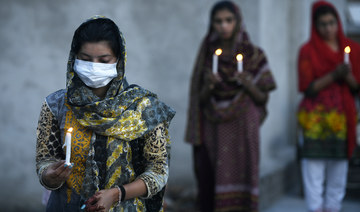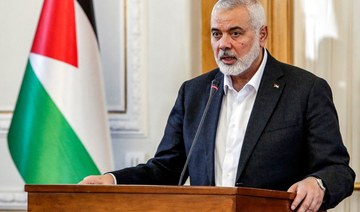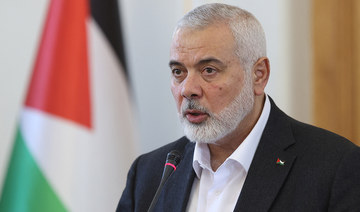BARCELONA: Christians around the world celebrated Easter at a distance on Sunday, with most churches closed and family gatherings canceled amid wide-ranging coronavirus shutdowns. British Prime Minister Boris Johnson, the first major world leader to test positive for the virus, was released from the hospital after a week but is not immediately returning to work.
Southern Europe and the United States, whose death toll of over 20,600 is now the world’s highest, have been the recent focal points of the pandemic. But coronavirus hot spots have been shifting constantly and new concerns are rising in Japan, Turkey and Britain, where the death toll surpassed 10,000.
Uncertainties loomed about the months ahead, with a top European Union official suggesting people hold off on making any summer vacation plans.
St. Peter’s Square at the Vatican, where tens of thousands would normally gather to hear Pope Francis deliver his “Urbi et Orbi” speech and blessing “to the city and the world,” was empty of crowds, ringed by police barricades. Francis celebrated Easter Mass inside the largely vacant basilica, with the faithful watching on TV at home.
Similar scenes played out around the world. With houses of worship shut by the Church of England, the Archbishop of Canterbury, Justin Welby, celebrated an Easter service from his kitchen in London for his flock of 85 milliion worldwide.
In Europe, countries used roadblocks, fines and other tactics to keep people from traveling over an Easter weekend with beautiful spring weather. As hard-hit countries like Italy and Spain see reduced daily virus infections and deaths, economic pressures are mounting to loosen the tight restrictions on daily life to fight off the pandemic.
German President Frank-Walter Steinmeier told his compatriots in a rare televised address: “Every one of you has changed his life radically; every one of you has saved human lives in doing so and is saving more every day.”
When and how the restrictions are loosened is something that “all of us have ... in our hands, with our patience and our discipline,” he said.
Some European nations are starting tentative moves to ease their shutdowns. Spain, which on Sunday reported its lowest daily growth in infections in three weeks, will allow workers in some nonessential industries to return to factories and construction sites Monday.
But much uncertainty remains. Chancellor Sebastian Kurz said in an open letter to Austrians that the virus will “be with us for months yet.”
And asked by Germany’s Bild am Sonntag newspaper whether people should book summer holidays, European Commission President Ursula von der Leyen replied: “I would advise waiting with such plans.”
“No one can make reliable forecasts for July and August at the moment,” she said.
Restaurants and bars have already missed out on holiday business.
“Sales are zero and we have a series of expenses: rent, stock, and we have even had to increase spending with security personnel to prevent robberies,” said Pablo Gonzalo, a bar manager in the southern Spanish city of Malaga.
In his Easter address, the pope called for global solidarity to confront the “epochal challenge” of the pandemic. Francis urged political leaders to give hope and opportunity to the millions laid off work.
“This is not a time for self-centeredness, because the challenge we are facing is shared by all, without distinguishing between persons,” he said.
In Spain, churches rang their bells at noon to echo the pope’s message of comfort to the victims of the pandemic and to offer hope.
In Italy, Premier Giuseppe Conte thanked people for their sacrifices in fighting the virus, and acknowledged that many families are suffering the loss of loved ones as they celebrate Easter with empty places at the table.
“Together, we will make it,” Conte said in a Facebook post.
For most people, the coronavirus causes mild or moderate symptoms, such as fever and cough. But for others, especially older people and the infirm, it can cause severe symptoms and lead to death.
More than 1.79 million infections have been reported and 110,000 people have died worldwide, according to Johns Hopkins University. The US has the highest numbers, with over 530,000 confirmed cases. The figures certainly understate the true size and toll of the pandemic, due to limited testing, uneven counting of the dead and some governments’ desire to play down the extent of outbreaks.
While some nations think about a pandemic exit strategy, others are dealing with alarming rises in infections or deaths.
Turkey took many by surprise in imposing a partial weekend lockdown after previously taking a more relaxed approach. A sudden Friday evening announcement of a 48-hour curfew in 31 cities, including Ankara and Istanbul, prompted crowds to rush to grocery stores.
The country had previously imposed a curfew on those under 20 and over 65, exempting most of the workforce to keep its beleaguered economy on track.
In Japan, emergency medical groups warned that health care facilities are getting stretched thin, and masks and surgical gowns were running short amid a surge in patients.
The Israeli government approved a tight quarantine of several areas of Jerusalem, including the historic Old City, to slow the spread of the virus in its most susceptible neighborhoods.
Britain’s virus death toll passed the 10,000 mark, the fourth European country to do so, after steep rises in recent days.
Ahead of his release Sunday from St. Thomas’ Hospital in London, Johnson paid an emotional tribute to the National Health Service workers who treated him. He spent a week in the hospital, including three nights in the intensive care unit.
“I can’t thank them enough. I owe them my life,” said Johnson, 55, said in his first public statement since he was moved out of intensive care Thursday evening.
His office said he will continue his recovery at Chequers, the prime minister’s country home.
In the United States, about half the deaths are in the New York metropolitan area, but hospitalizations are slowing in the state and other indicators suggest that lockdowns and social distancing are “flattening the curve” of infections.
New York state reported 783 more deaths, for a total of over 8,600. Gov. Andrew Cuomo said the daily number of deaths is stabilizing, “but stabilizing at a horrific rate.”
“What do we do now? We stay the course,” said Cuomo, who like other leaders has warned that relaxing restrictions too soon could enable the virus to come back with a vengeance.
In the Midwest, pockets of contagion have alarmed local leaders and led to stricter enforcement.
Nearly 300 inmates at the Cook County Jail in Chicago have tested positive for the virus, and two have died. The county has set up a temporary morgue that can take more than 2,000 bodies.
Wisconsin health officials expect to see an increase in virus cases after thousands went to the polls Tuesday to vote in the state’s primary election.
Twenty-four residents of an Indiana nursing home hit by COVID-19 have died, while a nursing home in Iowa saw 14 deaths.
The US government has not released a count of coronavirus deaths in nursing homes, but an Associated Press tally indicates at least 2,500 people linked to the virus have died in US nursing homes and long-term care facilities.
Amid virus, world’s Christians mark an Easter like no other
https://arab.news/jey9e
Amid virus, world’s Christians mark an Easter like no other
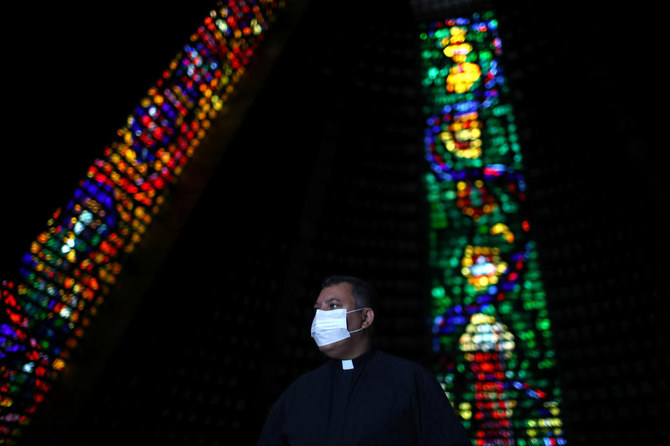
- In Europe, countries used roadblocks, fines and other tactics to keep people from traveling over an Easter weekend
- Turkey took many by surprise in imposing a partial weekend lockdown
Hamas chief Haniyeh arrives in Turkiye for talks
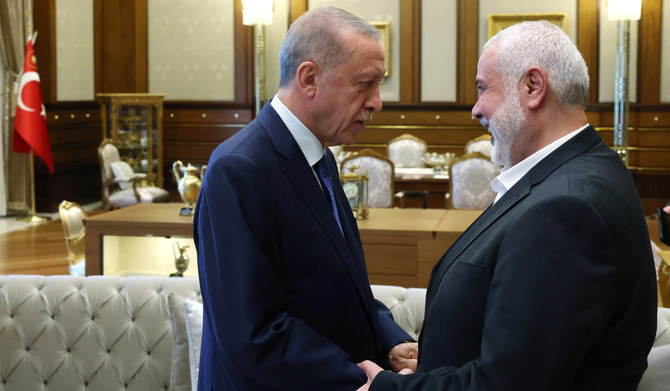
- Fidan said he spoke with Haniyeh, who lives in Qatar, about how Hamas — designated as a terrorist organization by Israel, the United States and the European Union — “must clearly express its expectations, especially about a two-state solution”
ISTANBUL: A leader of Palestinian militant group Hamas, Ismail Haniyeh, arrived in Istanbul Friday evening for talks with Turkish President Recep Tayyip Erdogan as the death toll in Gaza passed 34,000.
A statement from Hamas Friday said Erdogan and Haniyeh would discuss the conflict in Gaza, adding that the head of the group’s political bureau was accompanied by a delegation.
Middle East tensions are at a high after Israel’s reported attack on Iran and Gaza bracing for a new Israeli offensive.
Erdogan insisted on Wednesday that he would continue “to defend the Palestinian struggle and to be the voice of the oppressed Palestinian people.”
But talking to journalists on Friday, he refused to be drawn on the details on the meeting.
Turkish Foreign Minister Hakan Fidan was in Qatar Wednesday and said he spent three hours with Haniyeh and his aides for “a wide exchange of views in particular about negotiations for a ceasefire.”
Qatar, a mediator between Israel and Hamas, acknowledged Wednesday that negotiations to end hostilities in Gaza and liberate hostages were “stalling.”
Fidan said he spoke with Haniyeh, who lives in Qatar, about how Hamas — designated as a terrorist organization by Israel, the United States and the European Union — “must clearly express its expectations, especially about a two-state solution.”
Erdogan’s last meeting with Haniyeh was in July 2023 when Erdogan hosted him and Palestinian president Mahmud Abbas at the presidential palace in Ankara. Haniyeh had last met Fidan in Turkiye on January 2.
The war in Gaza started after Hamas’s unprecedented attack on Israel on October 7 that resulted in the deaths of about 1,170 people, mainly civilians, according to an AFP tally of official Israeli figures.
Militants also took about 250 hostages. Israel says around 129 are believed to be held in Gaza, including 34 presumed dead.
Israel’s retaliatory military campaign has killed at least 34,012 people, mostly women and children, according to Gaza’s Hamas-run health ministry.
Huge blast at military base used by Iraqi Popular Mobilization Forces, sources say

- PMF sources said the strikes targeted a headquarters of the PMF at the Kalso military base near the town of Iskandariya around 50 km south of Baghdad
BAGHDAD: A huge blast rocked a military base used by Iraq’s Popular Mobilization Forces (PMF) to the south of Baghdad late on Friday, two PMF and two security sources told Reuters.
The two security sources said the blast was a result of an unknown airstrike, which happened around midnight Friday.
The two PMF sources pointed out the strikes did not lead to casualties but caused material damage.
PMF sources said the strikes targeted a headquarters of the PMF at the Kalso military base near the town of Iskandariya around 50 km south of Baghdad.
Government officials did not immediately respond to a Reuters request for comment.
The PMF started out as a grouping of armed factions, many close to Iran, that was later recognized as a formal security force by Iraqi authorities.
Factions within the PMF took part in months of rocket and drone attacks on US forces in Iraq amid Israel’s Gaza campaign but ceased to do so in February.
Leaders of Jordan and Pakistan call UAE president to express concern about effects of severe storm

- Leaders passed on their best wishes to the country as it recovers from the storms
DUBAI: The president of the UAE, Sheikh Mohammed bin Zayed Al-Nahyan, received telephone calls from King Abdullah of Jordan and Pakistan’s Prime Minister Shehbaz Sharif on Friday, during which they expressed concern about the effects of the severe weather, including unusually heavy rainfall, that battered parts of the country this week.
They also passed on their best wishes to the country as it recovers from the storms and “conveyed their heartfelt hopes for the safety and prosperity of the UAE and its people, praying for their protection from any harm,” the Emirates News Agency reported.
Sheikh Mohammed thanked both leaders for their warm sentiments, and emphasized the strong bonds between the UAE and their nations.
The UAE and neighboring Oman were hit by unprecedented rainfall and flooding on Tuesday, with more than 250 millimeters of rain falling in parts of the Emirates, considerably more than is normally seen in a year. Dubai International Airport was forced to close temporarily when runways were flooded.
Peshmerga fighter dies in Turkish strike in north Iraq

JEDDAH: A member of the Kurdish Peshmerga security forces was killed on Friday in a Turkish drone strike in the autonomous Kurdistan region of northern Iraq.
Ankara regularly carries out ground and air operations in the region against positions of the outlawed PKK, the Kurdish separatist group that has waged a decades-long insurgency against the Turkish state.
The victim of Friday’s attack died in a drone strike on his vehicle, said Ihsan Chalabi, mayor of the mountainous Sidakan district near Iraq’s borders with Turkiye and Iran.
For decades, Turkiye has operated several dozen military bases in northern Iraq in its war against the PKK, which Ankara and its Western allies consider a terrorist group.
Both Baghdad and the Kurdish regional government have been accused of tolerating Turkiye’s military activities to preserve their close economic ties.
At the beginning of April, a man described as “high-ranking military official” from the PKK was killed in a Turkish drone strike on a car in the mountainous Sinjar region, according to the Kurdistan counterterrorism services.
Turkish President Recep Tayyip Erdogan is expected to visit Baghdad on Monday on his first official visit to Iraq since 2011.
Iraq’s Defense Minister Thabet Al-Abassi in March ruled out joint military operations against the PKK, but said that Turkiye and Iraq would “work to set up a joint intelligence coordination center.”
Middle East in ‘shadow of uncertainty due to regional conflicts’

WASHINGTON: Economies in the Middle East and North Africa face a “shadow of uncertainty” from ongoing tensions in the region, a senior IMF official said.
“We are in a context where the overall outlook is cast into shadows,” Jihad Azour, the International Monetary Fund’s director for the Middle East and Central Asia department, said in an interview in Washington.
“The shadow of uncertainty on the geopolitical side is an important one,” added Azour, a recent candidate for the next Lebanese president.
In the face of the ongoing conflicts in Gaza and Sudan and a recent cut to oil supplies by Gulf countries, the IMF has pared back its growth outlook for the Middle East and North Africa region once again.
FASTFACT
Economic activity in Gaza has ‘come to a standstill’ and the IMF estimates that economic output in the West Bank and Gaza contracted by six percent last year.
The IMF expects growth in MENA of 2.7 percent this year — 0.2 percentage points below its January forecast — before picking up again next year, the IMF said in its regional economic outlook report.
The risks to growth in the MENA region remain heightened, the IMF said, pointing to the danger of greater regional spillovers from the ongoing Israel-Gaza war.
“We have concerns about the immediate and lasting impact of conflict,” Azour said.
The IMF report said that economic activity in Gaza has “come to a standstill” and estimates that economic output in the West Bank and Gaza contracted by 6 percent last year.
The IMF said the report excludes economic projections for the West Bank and Gaza for the next five years “on account of the unusually high degree of uncertainty.”
The IMF cannot lend to the West Bank and Gaza because they are not IMF member countries.
However, Azour said it has provided the Palestinian Authority and the central bank with technical assistance during the current conflict.
“When we move into the reconstruction phase, we will be part of the international community support to the region,” he added.
Azour also discussed the situation in Sudan, where thousands have been killed in a civil war that has also devastated the economy, causing it to contract by almost 20 percent last year, according to the IMF.
“The country is barely functioning, institutions have been dismantled,” he said.
“And for an economy, for a country like Sudan, with all this potential, it’s important to stop the bleeding very quickly and move to a phase of reconstruction,” he added.
The recent Houthi attacks have particularly badly hit the Egyptian economy on Red Sea shipping, which caused trade through the Egypt-run Suez Canal to more than halve — depriving the country of a key source of foreign exchange.
Egypt reached an agreement last month to increase an existing IMF loan package from $3 billion to $8 billion after its central bank hiked interest rates and allowed the pound to plunge by nearly 40 percent.
A key pillar of the current IMF program is the privatization of Egypt’s state-owned enterprises, many of which are owned by or linked to the military.
“This is a priority for Egypt,” Azour said. Egypt needs to have a growing private sector and give space for the private sector to create more jobs.”
“We have an opportunity to re-engineer the state’s role, to give the state more responsibility as an enabler and less as a competitor,” he said.





